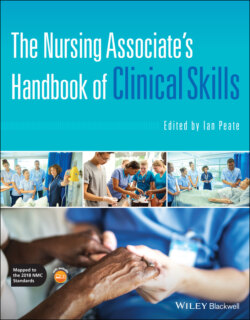Читать книгу The Nursing Associate's Handbook of Clinical Skills - Группа авторов - Страница 149
Touch Point
ОглавлениеEmotional intelligence can be described as the ability to monitor or control own emotions, as well to the emotions of those around you. This involves recognising feelings, self‐awareness, how emotions affect relationships and also how this can be managed.
Table 6.1 Branches and characteristics of emotional intelligence theoretical framework.
Source: Based on Mayer & Salovey (1997).
| BRANCH 1 | BRANCH 2 | BRANCH 3 | BRANCH 4 |
|---|---|---|---|
| Perceiving emotions (PE) | Facilitating thought with emotions (FE) | Understanding emotions (UE) | Managing emotions (ME) |
| Characteristics | Characteristics | Characteristics | Characteristics |
| Self‐awarenessEmotional self‐awarenessAccurate self‐assessmentSelf‐confidenceGauging the moodTuning into your sense | Emotional self‐controlCognitive process – comprehension of language, learning, reasoning, problem‐solving, decision‐makingIntuitionInitiativeAdaptabilityConscientiousnessTrustworthiness | EmpathyRecognitionClinical reasoningCritical thinkingClinical judgement | CommunicationWorking as a team – working towards similar goalsNurturing relationships – buildings rapportChange agentLeadershipDeveloping self and others – personal growthInfluencesConflicts |
Eraut (2000) purposes two distinct elements of knowledge from which information is gathered; knowledge embedded in routines and protocols and knowledge that is explicitly needed at the time – intuition. Such knowledge may influence how the patient is assessed, what decisions are made and/or how the nursing associate interacts with the patient. Intuition is often proposed as one of the defining characteristics of expertise and has been the topic of considerable debate. Some believe that it does not exist (English 1993, cited in den Hertog & Niessen 2019), while others advocate intuition in nursing as a genuine phenomenon (Benner 1984).
Intuition is characterised has ‘having a gut feeling’ about something which might impress ‘a bystander of the suddenness and nearly magical nature of these behaviours’ (Gobet & Chassy 2008, p. 130). In general, intuition involves a rapid perception, lack of awareness of the process engaged, associated presence of emotions and holistic understanding of the problem situation (Benner 1984; Gobet & Chassy 2008). Mayer & Salovey (1997) proposed that some individuals possess greater ability than others to reason about and use emotionally intense information to enhance both cognitive activity and social functioning.
Our ability to perceive, process and manage emotional information varies greatly. Nursing is an emotionally demanding healthcare practice, and nursing associates need to understand their own emotions and perceptions in order to understand a patient’s needs and hence develop a therapeutic relationship; by using our emotions, judgements are formed, and decisions are acted upon (James et al. 2010).
